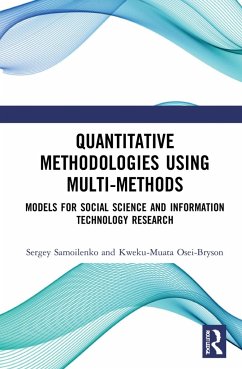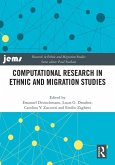Sergey Samoilenko, Kweku-Muata Osei-Bryson
Quantitative Methodologies Using Multi-Methods
Models for Social Science and Information Technology Research
Sergey Samoilenko, Kweku-Muata Osei-Bryson
Quantitative Methodologies Using Multi-Methods
Models for Social Science and Information Technology Research
- Gebundenes Buch
- Merkliste
- Auf die Merkliste
- Bewerten Bewerten
- Teilen
- Produkt teilen
- Produkterinnerung
- Produkterinnerung
Written for researchers engaged in quantitative non-parametric investigations, particularly in the area of Information and Communication Technology for Development (ICT4D), the book discusses multi-method methodologies based on the building-block design. Application of the methodologies is illustrated by research into ICT4D in Sub-Saharan Africa.
Andere Kunden interessierten sich auch für
![Ransomware Ransomware]() Ravindra DasRansomware139,99 €
Ravindra DasRansomware139,99 €![Data Mining for Intelligence, Fraud & Criminal Detection Data Mining for Intelligence, Fraud & Criminal Detection]() Christopher WestphalData Mining for Intelligence, Fraud & Criminal Detection176,99 €
Christopher WestphalData Mining for Intelligence, Fraud & Criminal Detection176,99 €![Computational Research in Ethnic and Migration Studies Computational Research in Ethnic and Migration Studies]() Computational Research in Ethnic and Migration Studies189,99 €
Computational Research in Ethnic and Migration Studies189,99 €![The Security Hippie The Security Hippie]() Barak EngelThe Security Hippie145,99 €
Barak EngelThe Security Hippie145,99 €![The Gardener of Governance The Gardener of Governance]() Rainer LenzThe Gardener of Governance160,99 €
Rainer LenzThe Gardener of Governance160,99 €![Investigator's Guide to Steganography Investigator's Guide to Steganography]() Gregory KipperInvestigator's Guide to Steganography124,99 €
Gregory KipperInvestigator's Guide to Steganography124,99 €![Effective Surveillance for Homeland Security Effective Surveillance for Homeland Security]() Effective Surveillance for Homeland Security199,99 €
Effective Surveillance for Homeland Security199,99 €-
-
-
Written for researchers engaged in quantitative non-parametric investigations, particularly in the area of Information and Communication Technology for Development (ICT4D), the book discusses multi-method methodologies based on the building-block design. Application of the methodologies is illustrated by research into ICT4D in Sub-Saharan Africa.
Hinweis: Dieser Artikel kann nur an eine deutsche Lieferadresse ausgeliefert werden.
Hinweis: Dieser Artikel kann nur an eine deutsche Lieferadresse ausgeliefert werden.
Produktdetails
- Produktdetails
- Verlag: CRC Press
- Seitenzahl: 292
- Erscheinungstermin: 23. August 2021
- Englisch
- Abmessung: 234mm x 156mm x 19mm
- Gewicht: 612g
- ISBN-13: 9780367903961
- ISBN-10: 0367903962
- Artikelnr.: 62224922
- Herstellerkennzeichnung
- Libri GmbH
- Europaallee 1
- 36244 Bad Hersfeld
- gpsr@libri.de
- Verlag: CRC Press
- Seitenzahl: 292
- Erscheinungstermin: 23. August 2021
- Englisch
- Abmessung: 234mm x 156mm x 19mm
- Gewicht: 612g
- ISBN-13: 9780367903961
- ISBN-10: 0367903962
- Artikelnr.: 62224922
- Herstellerkennzeichnung
- Libri GmbH
- Europaallee 1
- 36244 Bad Hersfeld
- gpsr@libri.de
Sergey Samoilenko is an associate professor and the Chair of the Department of Computer Science and Computer Information Systems at Averett University, in Danville, Virginia. Sergey's current research interests include IT and productivity, data mining, and IS development. He holds his PhD and MS in information systems from Virginia Commonwealth University. He has published in the European Journal of Operational Research, Journal of Global Information Technology Management, International Journal of Production Economics, Expert Systems with Applications, and Information Systems Frontiers, among other journals, as well as in numerous conference proceedings. Kweku-Muata Osei-Bryson is professor of Information Systems at Virginia Commonwealth University. Previously he was professor of information systems and decision analysis in the School of Business at Howard University, Washington, DC, USA. He has also worked as an information systems practitioner in both industry and government. His research areas include: Data Mining, Decision Support Systems, Knowledge Management, IS Security, e-Commerce, IT for Development, Database Management, IS Outsourcing, Multi-Criteria Decision Making. He has published in various leading journals including: Decision Support Systems, Information Systems Journal, Expert Systems with Applications, European Journal of Information Systems, Information Systems Frontiers, Knowledge Management Research & Practice, Information Sciences, Information & Management, Journal of the Association for Information Systems, Journal of Information Technology for Development, Journal of Database Management, Computers & Operations Research, Journal of the Operational Research Society, & the European Journal of Operational Research.
Section I: Development of the Methodological Modules. 1. Pre Requisite
General Questions. 2. Components of Multi-Method Methodologies. 3.
Framework for Methodological Modules. Section II: Description of the
Methodological Modules. 4. A1: Homogeneous Sample - DEA and DTI. 5. A2:
Homogeneous Sample - DEA and ARM. 6. B1: Heterogeneous Sample (Groupings
Are Given) DTI and ARM. 7. B2: Heterogeneous Sample (Groupings Are Given) -
DTI and MR. 8. B3: Heterogeneous Sample (Groupings Are Given) - DTI, DEA,
and ARM. 9. B4: Heterogeneous Sample (Groupings Are Given) - DTI, DEA, and
NN. 10. C1: Heterogeneous Sample (Groupings Are Not Known) CA and DTI. 11.
C2: Heterogeneous Sample (Groupings Are Not Known) - CA and ARM. C3:
Heterogeneous Sample (Groupings Are Not Known) - CA, DTI, and MR. 13: C4:
Heterogeneous Sample (Groupngs Are Not Known) - CA, DTI, and ARM. 14. C5:
Heterogeneous Sample (Groupings Are Not Known) - CA and DEA. 15. C6:
Heterogeneous Sample (Groupings Are Not Known) - CA, DEA, and ARM. 16. C7:
Heterogeneous Sample (Groupings Are Not Known) - CEA, DTI, and DEA. 17. C8:
Heterogeneous Sample: Groupings Are Not Known) - CA, DTI, DEA, and NN.
Section III: Methodological Modules - Examples of their Application. 18. A
Hybrid DEA/DM-based DSS for Productivity-Driven Environments. 19.
Determining Sources of Relative Inefficiency in Heterogeneous Samples.
20.Exploring Context Specific Micro-Economic Impacts of ITC Capabilities.
21. A Methodology for Identifying Sources of Disparities in the
Socio-econimic Outcomes of ITC Capabilities in SSA's. 22. Discovering
Common Casual Structures that Describe Context-Diverse Heterogeneous
Groups. 23. An Empirical Investigation of ITC Capabilities and the Cost of
Business Start-up Procedures in Sub-Saharan African Economies. 24.
Exploring the Socio-Economic Impacts of ITC-Enabled Public Value in
Sub-Saharan Africa. 25. Contributing Factors to Information Technology
Investment Utilization in Transition Economies. 26. Increasing the
Discriminatory Power of DEA in the Presence of the Sample Heterogeneity
with Cluster Analysis and Decision Trees. 27. An Exploration of the
Intrinsic Negative Socio-economic Implications of ICT Interventions.
Section IV: Appendix X. Appendix X1: Modls of Economic Growth. Appendix X2:
A Model of the Socio-economic Impact of ICT.
General Questions. 2. Components of Multi-Method Methodologies. 3.
Framework for Methodological Modules. Section II: Description of the
Methodological Modules. 4. A1: Homogeneous Sample - DEA and DTI. 5. A2:
Homogeneous Sample - DEA and ARM. 6. B1: Heterogeneous Sample (Groupings
Are Given) DTI and ARM. 7. B2: Heterogeneous Sample (Groupings Are Given) -
DTI and MR. 8. B3: Heterogeneous Sample (Groupings Are Given) - DTI, DEA,
and ARM. 9. B4: Heterogeneous Sample (Groupings Are Given) - DTI, DEA, and
NN. 10. C1: Heterogeneous Sample (Groupings Are Not Known) CA and DTI. 11.
C2: Heterogeneous Sample (Groupings Are Not Known) - CA and ARM. C3:
Heterogeneous Sample (Groupings Are Not Known) - CA, DTI, and MR. 13: C4:
Heterogeneous Sample (Groupngs Are Not Known) - CA, DTI, and ARM. 14. C5:
Heterogeneous Sample (Groupings Are Not Known) - CA and DEA. 15. C6:
Heterogeneous Sample (Groupings Are Not Known) - CA, DEA, and ARM. 16. C7:
Heterogeneous Sample (Groupings Are Not Known) - CEA, DTI, and DEA. 17. C8:
Heterogeneous Sample: Groupings Are Not Known) - CA, DTI, DEA, and NN.
Section III: Methodological Modules - Examples of their Application. 18. A
Hybrid DEA/DM-based DSS for Productivity-Driven Environments. 19.
Determining Sources of Relative Inefficiency in Heterogeneous Samples.
20.Exploring Context Specific Micro-Economic Impacts of ITC Capabilities.
21. A Methodology for Identifying Sources of Disparities in the
Socio-econimic Outcomes of ITC Capabilities in SSA's. 22. Discovering
Common Casual Structures that Describe Context-Diverse Heterogeneous
Groups. 23. An Empirical Investigation of ITC Capabilities and the Cost of
Business Start-up Procedures in Sub-Saharan African Economies. 24.
Exploring the Socio-Economic Impacts of ITC-Enabled Public Value in
Sub-Saharan Africa. 25. Contributing Factors to Information Technology
Investment Utilization in Transition Economies. 26. Increasing the
Discriminatory Power of DEA in the Presence of the Sample Heterogeneity
with Cluster Analysis and Decision Trees. 27. An Exploration of the
Intrinsic Negative Socio-economic Implications of ICT Interventions.
Section IV: Appendix X. Appendix X1: Modls of Economic Growth. Appendix X2:
A Model of the Socio-economic Impact of ICT.
Section I: Development of the Methodological Modules. 1. Pre Requisite
General Questions. 2. Components of Multi-Method Methodologies. 3.
Framework for Methodological Modules. Section II: Description of the
Methodological Modules. 4. A1: Homogeneous Sample - DEA and DTI. 5. A2:
Homogeneous Sample - DEA and ARM. 6. B1: Heterogeneous Sample (Groupings
Are Given) DTI and ARM. 7. B2: Heterogeneous Sample (Groupings Are Given) -
DTI and MR. 8. B3: Heterogeneous Sample (Groupings Are Given) - DTI, DEA,
and ARM. 9. B4: Heterogeneous Sample (Groupings Are Given) - DTI, DEA, and
NN. 10. C1: Heterogeneous Sample (Groupings Are Not Known) CA and DTI. 11.
C2: Heterogeneous Sample (Groupings Are Not Known) - CA and ARM. C3:
Heterogeneous Sample (Groupings Are Not Known) - CA, DTI, and MR. 13: C4:
Heterogeneous Sample (Groupngs Are Not Known) - CA, DTI, and ARM. 14. C5:
Heterogeneous Sample (Groupings Are Not Known) - CA and DEA. 15. C6:
Heterogeneous Sample (Groupings Are Not Known) - CA, DEA, and ARM. 16. C7:
Heterogeneous Sample (Groupings Are Not Known) - CEA, DTI, and DEA. 17. C8:
Heterogeneous Sample: Groupings Are Not Known) - CA, DTI, DEA, and NN.
Section III: Methodological Modules - Examples of their Application. 18. A
Hybrid DEA/DM-based DSS for Productivity-Driven Environments. 19.
Determining Sources of Relative Inefficiency in Heterogeneous Samples.
20.Exploring Context Specific Micro-Economic Impacts of ITC Capabilities.
21. A Methodology for Identifying Sources of Disparities in the
Socio-econimic Outcomes of ITC Capabilities in SSA's. 22. Discovering
Common Casual Structures that Describe Context-Diverse Heterogeneous
Groups. 23. An Empirical Investigation of ITC Capabilities and the Cost of
Business Start-up Procedures in Sub-Saharan African Economies. 24.
Exploring the Socio-Economic Impacts of ITC-Enabled Public Value in
Sub-Saharan Africa. 25. Contributing Factors to Information Technology
Investment Utilization in Transition Economies. 26. Increasing the
Discriminatory Power of DEA in the Presence of the Sample Heterogeneity
with Cluster Analysis and Decision Trees. 27. An Exploration of the
Intrinsic Negative Socio-economic Implications of ICT Interventions.
Section IV: Appendix X. Appendix X1: Modls of Economic Growth. Appendix X2:
A Model of the Socio-economic Impact of ICT.
General Questions. 2. Components of Multi-Method Methodologies. 3.
Framework for Methodological Modules. Section II: Description of the
Methodological Modules. 4. A1: Homogeneous Sample - DEA and DTI. 5. A2:
Homogeneous Sample - DEA and ARM. 6. B1: Heterogeneous Sample (Groupings
Are Given) DTI and ARM. 7. B2: Heterogeneous Sample (Groupings Are Given) -
DTI and MR. 8. B3: Heterogeneous Sample (Groupings Are Given) - DTI, DEA,
and ARM. 9. B4: Heterogeneous Sample (Groupings Are Given) - DTI, DEA, and
NN. 10. C1: Heterogeneous Sample (Groupings Are Not Known) CA and DTI. 11.
C2: Heterogeneous Sample (Groupings Are Not Known) - CA and ARM. C3:
Heterogeneous Sample (Groupings Are Not Known) - CA, DTI, and MR. 13: C4:
Heterogeneous Sample (Groupngs Are Not Known) - CA, DTI, and ARM. 14. C5:
Heterogeneous Sample (Groupings Are Not Known) - CA and DEA. 15. C6:
Heterogeneous Sample (Groupings Are Not Known) - CA, DEA, and ARM. 16. C7:
Heterogeneous Sample (Groupings Are Not Known) - CEA, DTI, and DEA. 17. C8:
Heterogeneous Sample: Groupings Are Not Known) - CA, DTI, DEA, and NN.
Section III: Methodological Modules - Examples of their Application. 18. A
Hybrid DEA/DM-based DSS for Productivity-Driven Environments. 19.
Determining Sources of Relative Inefficiency in Heterogeneous Samples.
20.Exploring Context Specific Micro-Economic Impacts of ITC Capabilities.
21. A Methodology for Identifying Sources of Disparities in the
Socio-econimic Outcomes of ITC Capabilities in SSA's. 22. Discovering
Common Casual Structures that Describe Context-Diverse Heterogeneous
Groups. 23. An Empirical Investigation of ITC Capabilities and the Cost of
Business Start-up Procedures in Sub-Saharan African Economies. 24.
Exploring the Socio-Economic Impacts of ITC-Enabled Public Value in
Sub-Saharan Africa. 25. Contributing Factors to Information Technology
Investment Utilization in Transition Economies. 26. Increasing the
Discriminatory Power of DEA in the Presence of the Sample Heterogeneity
with Cluster Analysis and Decision Trees. 27. An Exploration of the
Intrinsic Negative Socio-economic Implications of ICT Interventions.
Section IV: Appendix X. Appendix X1: Modls of Economic Growth. Appendix X2:
A Model of the Socio-economic Impact of ICT.








